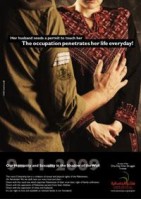Mada al-Carmel: Rape poster and Haifa Declaration
Mada al-Carmel and the “One Day One Struggle” campaign
On November 9, 2009, twenty NGOs in eleven countries held events as part of the “One Day One Struggle” campaign, organized by the Coalition for Sexual and Bodily Rights in Muslim Societies. The international coordinators described the impetus for the campaign:
“Human rights, including sexual and reproductive rights have been under attack in all Muslim societies. Rising conservatism, fueled by militarism, increasing inequalities, the politicization of religion and Islamophobia have strengthened patriarchal and extremist religious ideologies.”
In contrast, the three NGOs representing “Palestine” (even though all three are located within the pre-67 borders of Israel) – Mada al Carmel, Women Against Violence ($794,500) and the Arab Forum for Sexuality, Education and Health – did not focus on Muslim society. Instead, these organizations, funded in part by the European Union and the New Israel Fund (details below), chose to
“highlight[] the Israeli structural and legal violations of sexual, bodily, psychological, social and economic rights of Palestinians that intersect with the patriarchal social context, which restrain individual freedoms, perpetuates women’s inferior status and imposes silence on physical, psychological and sexual violations committed against women.”
Their version of the campaign, entitled “My Land, Space, Body and Sexuality: Palestinians in the Shadow of the Wall,” was geared toward “expos[ing] Israel’s racist policies.”
Mada al-Carmel and the “rape poster”
 As part of the campaign, Mada al-Carmel, along with another group, issued a press release (November 9, 2009) that listed a Mada al-Carmel official as a “media coordinator” for the campaign. The press release was disseminated online and in emails with two posters attached:
As part of the campaign, Mada al-Carmel, along with another group, issued a press release (November 9, 2009) that listed a Mada al-Carmel official as a “media coordinator” for the campaign. The press release was disseminated online and in emails with two posters attached:
- Portraying the unwanted sexual contact of a Palestinian woman by an Israeli soldier, alongside the caption: “Her husband needs a permit to touch her. The occupation penetrates her life everyday!”
- Portraying the unwanted sexual contact of a Palestinian man by a female Israeli soldier, with a corresponding caption.
In a Jewish Chronicle article about the poster, a Mada al-Carmel researcher denied that the campaign was about rape or sexual harassment: “we tried to show how the political issue, which is what everybody talks about, has a daily effect on the lives of Palestinian women. The poster was just an artistic device to convey a message.”
NIF-UK Chair Nicholas Saphir defended the poster: “NIF will continue to support them in the interests of sustaining [Israel’s] vibrant democracy.”
However, in a letter to the Jewish Chronicle, the director of Mada al-Carmel’s Gender Studies Program claimed that “The Arab Forum for Sexuality alone produced and disseminated the poster depicted in the [Jewish Chronicle] report” and Mada al-Carmel was not responsible for its contents.
This claim is inconsistent with the press release circulated (with the poster) in Mada al-Carmel’s name as well as the comments in the Jewish Chronicle. Beyond the poster, other elements of the campaign, as noted above, were predicated on accusations of “Israel’s racist policies.”
Haifa Declaration (May 15, 2007)
Mada al-Carmel was instrumental in composing the Haifa Declaration, “a consensual statement of a collective vision that Palestinian citizens in Israel articulate about themselves.” The document calls for a “change in the definition of the State of Israel from a Jewish state,” and the implementation of the Palestinian “right of return.”
It concludes that “We believe that exploiting [the Holocaust] and its consequences in order to legitimize the right of the Jews to establish a state at the expense of the Palestinian people serves to belittle universal, human, and moral lessons…”
The authors “look with pride on the resistance to the military regime put up by our people and its national leadership,” and refer to “massacres” committed by the “Zionist movement” and Israel’s “policies of subjugation and oppression in excess of those of the apartheid regime in South Africa.”
There is a token reference in the Haifa Declaration to “the right of the Israeli Jewish people to self-determination,” but it is undermined by the Declaration’s erasure of the Jewish framework of the state.
Funding
- New Israel Fund (NIF): $200,000 in 2008
- EU: One of three partners for a €358,827 three-year grant (March 2009 – Feb. 2012), “Gender- and Minority-Mainstreaming of the Israeli National Budget”
- International Development Research Center (Canadian government): 3 multi-year projects totaling $C927,000 (2006, 2008, 2009). Funding ended April 2010.
